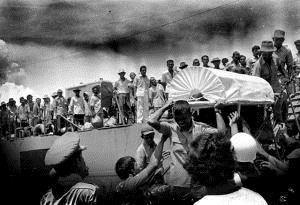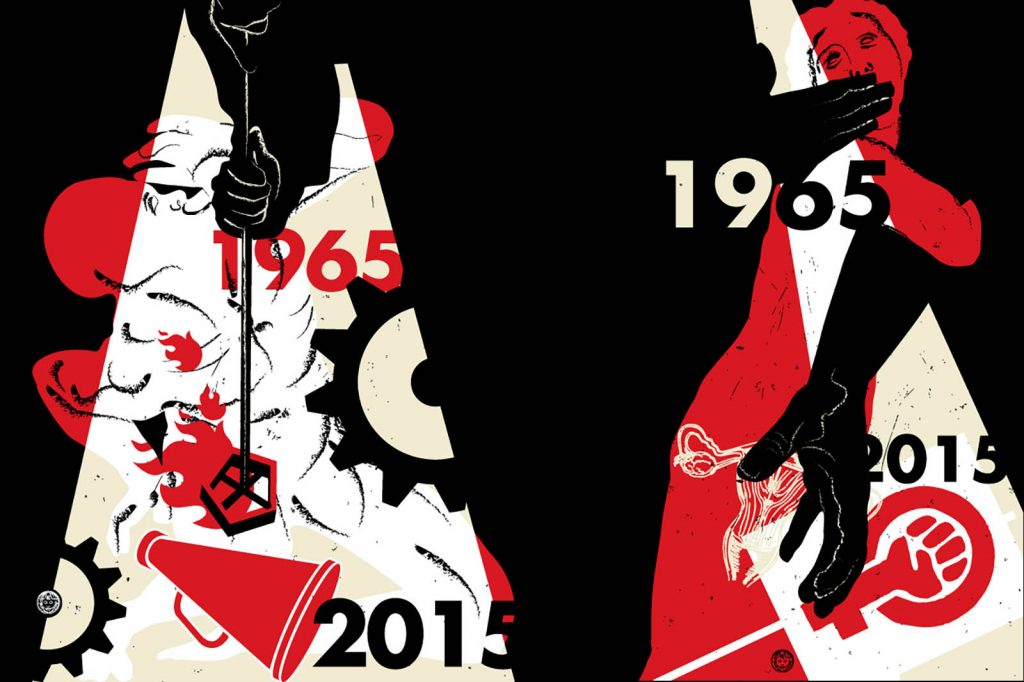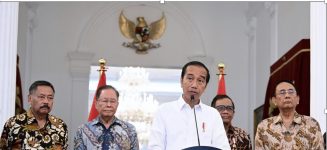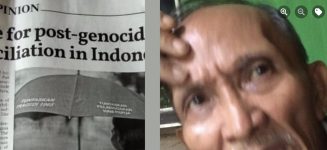Indonesia has carried a heavy debt for almost fifty years. Very often – too often – we forget, or pretend to forget, this political-moral debt. We ignore our conscience towards a huge tragedy in our recent past. Almost half a century – nine months from now to be exact – people were massacred throughout Indonesia starting from October 1, 1965. This was paired with illegal arrests, pursuit, incarceration, torture, sexual abuse, disappearances, exile, defamation, stigmatisation and the denial of people’s civil rights for all that were accused of being involved in the attempted September 30 coup, including their families and friends. The word ‘terlibat’ (involved) became a powerful one, as it was able to kill. As if all this were not enough, this tragedy was followed by ignorance and indifference. ‘EGP, Emang gue pikirin’ (Not my problem), so they said today. Such was the general attitude towards those events, the perpetrators and victims of the great tragedy that could rightly be called ‘crimes against humanity’.
Three key points – veiled crimes, amnesia and impunity – are now almost half a century old. In the meantime no one – in our society or in the international community – really knows exactly what had happened, who masterminded it, and carried it out, and what has actually become of the victims and the survivors.
These three points are intertwined and come down to this: we do not exactly know what happened and who did it, what the truth is, and how to obtain justice for those who suffered.
In fact, every act of violence degrades one’s dignity, and mass violence degrades the dignity of humanity itself. This moral debt must be paid with a shared conscience. Not only to obtain justice for the victims and survivors, but also for us and our future together as a nation.
This is why a number of researchers, legal scholars and activists from Indonesia and other countries have initiated a people’s tribunal: the International People’s Tribunal (IPT). While it may not be a formal process, and does not assure compensation for the victims and survivors, it aims to uncover the truth, trace back through the events and demand that the Indonesian state take its responsibility to follow this up according to the law (See Preamble).

Thus, we introduce this website, which aims to accompany the IPT by revealing its process and data, provide an information platform, and space for comments and reactions from the public, whoever they are and wherever they may be. We invite you to make use of this site, leave your comments and work together with us.
The year ‘1965’ has been dubbed ‘the never ending year’. Such title screamed when in countries such as South Africa and a number of Latin American ones similar tragedies were only partially resolved with transitional justice in post-authoritarian transformations. It screamed even louder in Indonesia and countries like Spain. In Spain, the perpetrators of their great tragedy enjoyed impunity through what is called ‘the Silent Pact’, followed by legal amnesty for General Franco’s followers who committed human rights violations. In Indonesia, the situation is similar: there is impunity by just keeping silent about General Soeharto’s followers who committed human rights violations.
With this dark history in the background, we have invited three writers at the launch of our website to remind us about a number of key points. Efforts to unveil the past, author Martin Aleida writes, is actually “not to incite tears, but to lend a hand to those victims of cruelty in our flawed civilisation.” With a people’s tribunal we will arrive at “the threshold of democracy, where victims’ cries for justice … will find a proper place in the history of this country.” These efforts, says Wijaya Herlambang, are not easy as at a certain point in time it may demand “the necessity of an ideological transformation.”
For almost half a century, we have let ourselves remain in the dark, despite the fact that mass violence against unarmed civilians is not something that should time and again receive forgiveness. That is why, to those who made our past remaining dark, we, together with John Roosa, should come to the conclusion: “No more excuse!”




One Reply to “Approaching Half Century ‘1965’”